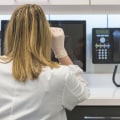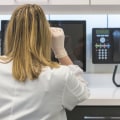A radiation dosimeter is a device that measures the dose absorption of external ionizing radiation. It is used by the person being monitored when using it as a personal dosimeter and is a record of the radiation dose received. Modern electronic personal dosimeters can provide a continuous reading of the cumulative dose and the current dose rate, and can warn the user with an audible alarm when a specified dose rate or cumulative dose is exceeded. Other dosimeters, such as thermoluminescent or film types, require post-use processing to reveal the cumulative dose received, and cannot give a current dose indication while in use.
Who Uses a Dosimeter and What Are Its Benefits?
Megan Stothart13-02-20231 minute read- Home
- Top Rated
- Do I Need a Dosimeter?
- Everything You Need to Know About Dosimeter Badges
- Why Should You Wear Your Dosimeter Badge Outside the Apron at Collar Level?
- What Does a Digital Dosimeter Measure?
- What is a Dosimeter in Radiography?
- What is the Most Common Form of Radiation Monitoring Dosimeters Made Of?
- What are the Different Types of Dosimeters?
- Where Should You Wear a Dosimeter or TLD During Fluoroscopy?
- What is a Pocket Dosimeter Used For?
- What is the Use of Dosimeters in Radiation Safety?
- Who Uses a Dosimeter and What Are Its Benefits?
- Who Wears a Radiation Dosimeter Badge?
- What Does a Dosimeter Measure? A Comprehensive Guide
- What is the Proper Way to Wear a Dosimeter?
- When Should You Wear Your Dosimeter Badge?
- What is a Dosimeter and What Does it Measure?
- Who is Required to Wear Dosimeters? A Comprehensive Guide
- What Does a Dosimeter Measure?
- What is the Most Common Dosimeter Used to Measure Personal Exposure?
- When Should Dosimeters Be Worn? A Comprehensive Guide
- Who Needs a Dosimeter? Understanding Radiation Dosimeter Badges
- The Benefits of Using Dosimetry in Radiation Protection
- What Does a Dosimeter Read? A Comprehensive Guide
- What is a Dosimeter in Radiology?
- Where Should You Wear Your Dosimeter or Radiation Badges?
- Where Should You Wear a Dosimeter During Fluoroscopy?
- Are Dosimeters Still Used in the Modern World?
- What Does a Dosimeter Not Record?
- Understanding the Different Types of Personal Dosimetry
- Do You Need to Wear a Dosimeter Badge?
- What is the Most Common Dosimeter Used for Radiation Protection?
- What are Dosimeters Used For?
- What Do Self Reading Dosimeters Measure?
- Types of Dosimeters: Which is the Most Common and Why?
- The Benefits of Using a Dosimeter
- What is the Purpose of Personal Dosimetry?
- When Should You Wear a Dosimeter?
- What Does a Pocket Dosimeter Measure?
- Understanding Radiation Safety and How to Use Radiation Detection Badges
- What are Dosimeters and Where are They Used?
- Why is a Dosimeter Used? A Comprehensive Guide
- Who Uses a Dosimeter and What Are Its Benefits?


